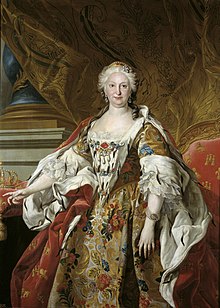Elisabeth Farnese
| Elisabeth Farnese | |
|---|---|
 |
|
| Queen consort of Spain | |
| Tenure | 24 December 1714 – 14 January 1724 |
| Tenure | 6 September 1724 – 9 July 1746 |
| Born |
25 October 1692 Palazzo della Pilotta, Parma |
| Died | 11 July 1766 (aged 73) Royal Palace of Aranjuez, Aranjuez, Spain |
| Burial | 17 July 1766 Royal Palace of La Granja de San Ildefonso |
| Spouse | Philip V of Spain |
| Issue see details... |
|
| House | Farnese |
| Father | Odoardo Farnese, Hereditary Prince of Parma |
| Mother | Dorothea Sophie of Neuburg |
| Religion | Roman Catholicism |
|
Styles of Elisabeth, Queen of Spain as consort |
|
|---|---|
 |
|
| Reference style | Her Catholic Majesty |
| Spoken style | Your Catholic Majesty |
| Alternative style | Sire |
Elisabeth Farnese (Italian: Elisabetta Farnese, Spanish: Isabel de Farnesio; 25 October 1692 – 11 July 1766) was Queen of Spain by marriage to King Philip V. She exerted great influence over Spain's foreign policy and was the de facto ruler of Spain from 1714 until 1746. From 1759 until 1760, she governed as regent.
Elisabeth was born at the Palazzo della Pilotta in Parma, daughter of Odoardo Farnese and Dorothea Sophie of Neuburg. Elisabeth would later become the heiress of her father's dominions after her uncle Francesco Farnese, Duke of Parma and his younger brother both remained childless.
Elisabeth was raised in seclusion in an apartment in the Palace in Parma. She had a difficult relationship with her mother, but was reportedly deeply devoted to her uncle-stepfather. She could speak and write Latin, French, and German and was schooled in rhetoric, philosophy, geography and history, but, reportedly, she found no interest in her studies and lacked intellectual interests. She was a better student within dance, studied painting under Pierantonio Avanzini and enjoyed music and embroidery. She survived a virulent attack of smallpox shortly after the War of the Spanish Succession.
Because of the lack of male heirs of her father, her uncle-stepfather and her youngest uncle, who all succeeded one another, preparations were done for succession of the Duchy of Parma in the female line through her. She was therefore made many marriage proposals. Victor Amadeus, Prince of Piedmont and Francesco d'Este, Hereditary Prince of Modena both asked for her hand but negotiations eventually failed, as well as Prince Pio della Mirandola. The Duchy of Parma would later be inherited by her first son, Infante Carlos. After his accession to the Spanish throne, the title passed on to her third son, Infante Felipe. It was he who founded the modern day House of Bourbon-Parma.
...
Wikipedia
